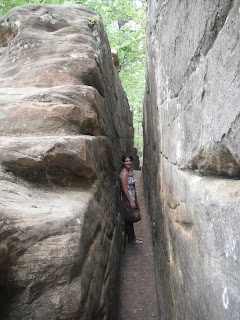After having the wonderful opportunity to go the meet-up in Kentucky, I wrote this speech to describe to a class at my school some of the things I saw, the people I met, and the thoughts I had.This weekend I went to eastern Kentucky, to the heart of Appalachia. In a meeting in Hazard, Kentucky, I met a woman named Pam Maggard. Pam was at the meeting because trucks barrel down her small street from early in the morning until late at night. The trucks come every day, even on Halloween. They leave the roads and the houses along them black with dust, so that parents worry about letting their kids play outside.
As I speak, trucks all across this part of America are rushing to and from of pitted mountains, carrying coal to places that have not been blessed with their own deposits.
At Carleton, we live in a time and a place where protecting the environment is important to a lot of people. Recycling is automatic and climate change is bad. But I don’t hear too much about the impact of our decisions about the environment on people.
Sometimes the thread that links someone like me and someone like Pam Maggard is hard to find and easy to ignore. But now I know. Workers blast open a mountain, load coal onto trucks, speed them through Pam Maggard’s neighborhood to a chain of factories. I plug in my computer, and electricity brightens the screen.
When you follow the thread to the source, the human impacts are everywhere. Bev May is a nurse practitioner who sees former miners trailed by tanks of oxygen. The Bailey’s house cracked through the brick from the daily blasts at a mine. Water is contaminated and people like Clinton Handshoe and Lucy Gearhart must pay for bottled water, week in and week out. Creeks and ponds like the ones where Josephine Martin where used to fish break and fill with toxic runoff.
But everyone understands that people need work, and coal companies provide some of the only jobs. Everyone has some connection to the industry. “It’s like a civil war,” Pam told me. The coal companies pay for local elementary schools to run a pro-coal energy program. In the windows of some shops and restaurants, signs read, “Black gold” and “We support Kentucky’s coal industry!”
The Carleton Voice states that our wind turbine accounts for about a third of our electricity, with the remaining 2/3 coming from conventional sources like coal. One of the things that is so special about our wind turbine is that we can see it. We can’t see the coal mines from our bedroom windows, but it doesn’t matter. We have to look beyond the obstacles of distance and abstraction and see Pam Maggard, Bev May, Clinton Handshoe, Lucy Gearhart, Josephine Martin.
Everything we do connects in some way to other people, especially in the things we use. Nothing comes from nowhere. Someone made every component of everything we use, someone transported it, someone sold it to us. And each of those actions--the making, the transporting, the selling--affected other people.
As society gets more and more complex, everything affects more and more people. Take a computer. 66 minerals go into the production of a computer, even before electricity is required to run them.
It’s not a simple matter. We can’t avoid interacting with other humans. But we can be aware that our decisions of what to buy, what to use and how to use it affect real, identifiable people with names and faces. We need electricity. But maybe we don’t need so much.
Reducing our consumption of electricity and connecting our actions to the lives of other people are small, important steps. But I believe that consumer power is not our only power. The laws of our country dictate the rules and regulation of coal mining, and we can advocate for responsible laws. Once we have laws, we can make sure that they are being enforced.
“We have some good laws,” says Rick Handshoe, a retired police radio operator from Floyd County, Kentucky. The problem is the inspectors and the officials who don’t hold the companies to them or fine coal companies pocket change when they are in violation. Rick spends hours each week meeting with inspectors, leading them to contaminated ponds, and painstakingly documenting the effects of mining on the county where he grew up. To prove that a particular stream naturally flowed year-round, he once photographed the running water every week for a year.
Rick, Pam, and thousands of people in Eastern Kentucky are fighting the assaults on their health, their homes, their water and their culture, but their voices are often unheard.
According to the Department of Energy, coal produces more than half of the electricity consumed in America. But the places where coal comes from are disproportionately poor and forgotten. According to the Census Bureau, the median income of Floyd County is $21,168, a little more than half of the national median of $41,994. Two out of three of my friends from Kentucky have never set foot in a county where coal is mined.
But if we, as outsiders, refuse to ignore the people who feel the effects of our illuminated rooms and clacking computers, if we shine the light of the media on this marginalized part of our country, if we question and demand action from our Congress, our President, and our corporations, maybe the coal industry will be held accountable to protecting people to whom we are linked every day.





